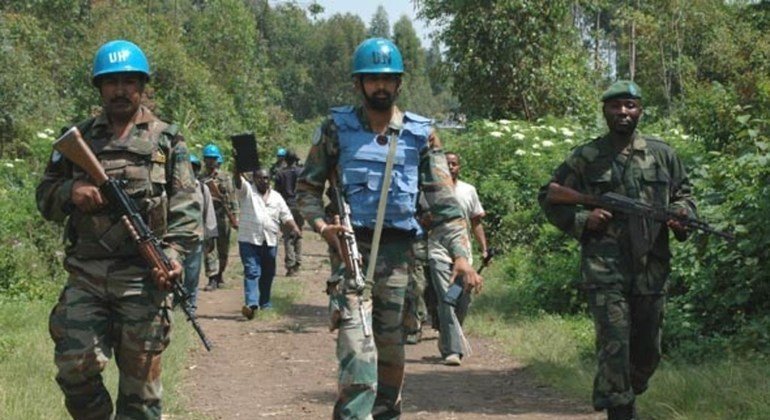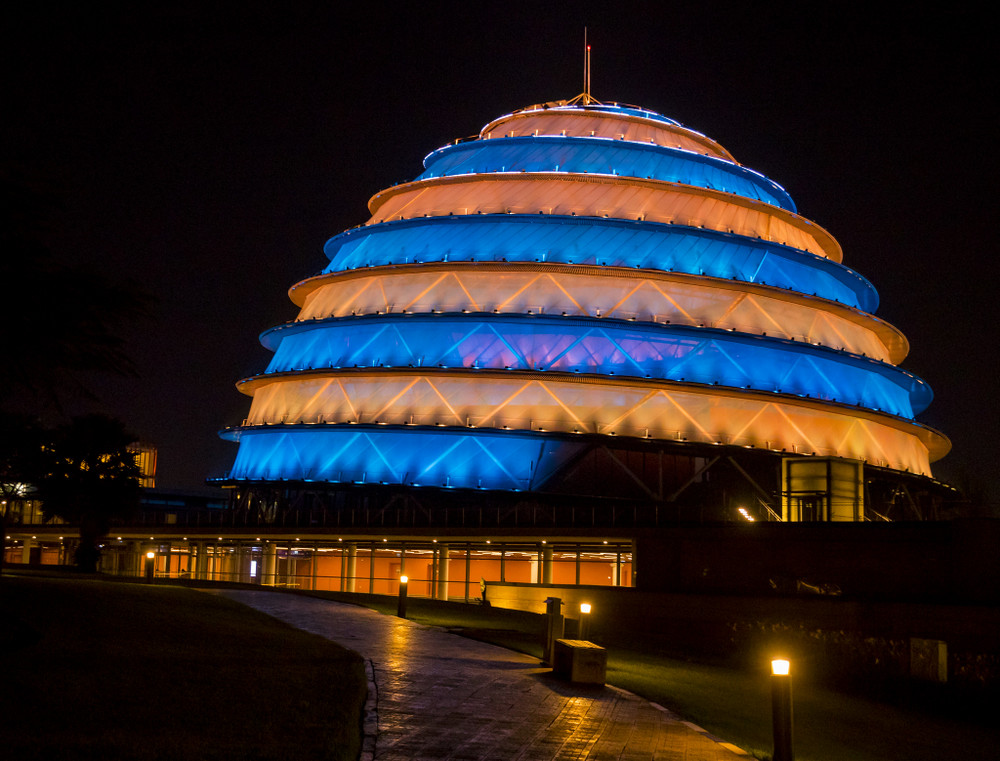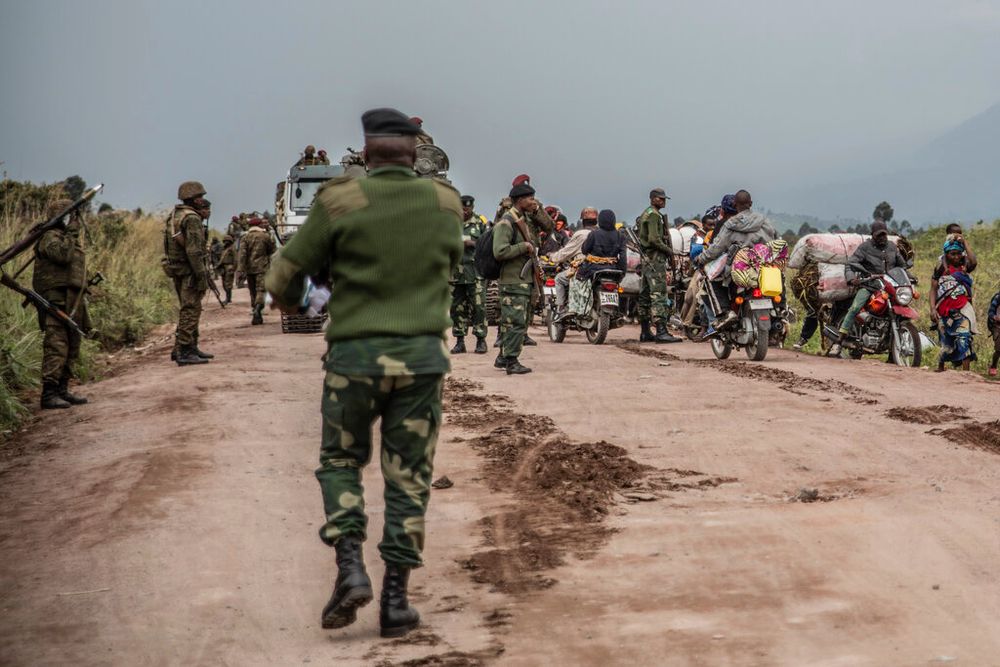Regional
Latest events in DRC prove MONUSCO complicity in sustaining genocidaires

What is currently happening in the east of
the Democratic Republic of Congo (DRC) is a failure of the international
community, an aide to Rwandan President Paul Kagame noted on June 1, alluding to the fact
that for nearly three decades, the UN’s Mission in the country, MONUSCO, made
no effort to uproot or deter remnants of the perpetrators of the 1994 Genocide
against the Tutsi in Rwanda.
Stephanie Nyombayire, the Presidential Press
Secretary, noted that 28 years on, with $1billion spent
by UN peacekeepers every year, when genocidaire FDLR are integrated into the
Congolese army, FARDC, and “empowered to shell Rwanda” from the DRC border, MONUSCO
can no longer claim "observer" status.
“That is complicity,” she tweeted.
Rwanda has closely
monitored events across the border ever since the recent resurgence of the M23 rebellion
there.
On May 23, artillery rockets were fired from
the DR Congo into Rwanda’s Districts of Musanze and Burera. The shelling, the
second this year, following similar attack on March 19, resulted in several
serious injuries to Rwandan citizens and damaged property.
Rwanda knows the attacks were a work of the Congolese
army, “working alongside the FDLR in their ranks.” Why the latter decided to
fire rockets into Rwanda, and not at M23 positions, does not surprise the
Rwandans who very well understand the FDLR’s modus operandi.
To make things worse, two Rwandan soldiers on
patrol along the common border, were “kidnapped by elements of the FDLR” and
are detained by DR Congo authorities. Rwanda requested for their protection and
immediate release but even after the intervention of Angolan President João
Lourenço, the authorities in Kinshasa did not immediately release the two
soldiers. But maybe they will. Or maybe they won’t. For now, we don’t want to
think about what happens if they don’t release them, or if more rockets land on
Rwandan territory, and Kigali decides that enough is enough.
It is becoming so hard to doubt the UN
Mission’s complicity simply because it cannot be unaware of the FARDC-FDLR collaboration
since the blue helmets are on the ground with the former.
During the interrogation of the two kidnapped
Rwandan soldiers, which happened in “questionable conditions,” MONUSCO was
present, Rwanda's Minister of Foreign Affairs, Dr Vincent Biruta, told members
of the diplomatic corps, on May 31. He said it is critical that MONUSCO acts
responsibly, and fully implements its mandate which includes fighting all armed
groups.
“What we are seeing today, are the
consequences of unresolved problems that have existed in the DRC since well
before 1994. For the last 28 years, there has been a proliferation in eastern
DRC of armed groups in general, dominated by the FDLR in particular, with all
its various splinter groups,” Dr Biruta said.
“This is a well-known fact to all, including
MONUSCO that has been operating in the area since 1999. The presence of the
FDLR has caused untold suffering to the people of eastern DRC, and perpetuated
insecurity in our region for close to three decades now.”
The FDLR unfinished genocidal agenda
The FDLR is an armed genocidal group of Rwandan
origin active in the eastern DRC for nearly three decades. Its members are
mostly Hutu Power ideologues who committed the 1994 genocide against the Tutsi
in Rwanda as well as those who still harbour the genocide ideology. The FDLR
was officially formed on September 30, 2000 after the Army for Liberation of
Rwanda (ALIR) – the genocidal outfits earlier name – was blacklisted as a
terrorist organization by USA after it murdered eight tourists from UK and USA
in Bwindi National park, and killed hundreds of civilians in eastern DRC.
To date, it has survived by preying on the
Congolese population, and plundering the country’s mineral resources in
collaboration with rogue Congolese military and civilian authorities, as well
as international elements. In 2016, FDLR’s internal wrangles led to the
creation of CNRD-Ubwiyunge, the highest record defection within FDLR, so far.
The two groups continue to represent a threat to Rwanda.
They are considering operating in a more
centralized manner with DRC nationals in their ranks. Formed and led by
remnants of the masterminds of the 1994 genocide against the Tutsi in Rwanda,
the militia is opposed to the post genocide regime in Kigali and has
persistently sought ways to return to power in Rwanda and finish what it
started in 1994, but failed. Their overall objective remains to overthrow the government
of Rwanda through violent means, or mount pressure to force the latter into what
they call an inter-Rwandan dialogue. The government in Rwanda categorically
made it clear that will be no dialogue with genocidaires as well as genocide
ideologues.
The FDLR's objectives include: positioning itself
as an incarnation of a united Hutu Power force which is near the Rwandan border
and mobilising Hutu supremacists in Rwanda and the diaspora for financial
support.
Hutu Power is a racist and ethnosupremacist ideology
asserting the ethnic superiority of the Hutu in the context of being
superior to the Tutsi and the Twa, and that therefore they are
entitled to dominate and murder these minority groups. Espoused by Hutu
extremists, widespread support for the ideology led to the 1994
genocide against the Tutsi.
For decades, the FDLR continues to take hostage
Rwandan Hutu refugees in eastern DRC and other Congolese Hutu and others with
the aim of getting a recruitment pool for fighters and human shields against
any military attack.
With the international Community looking the
other way, the group continues to create alliances and links with other
subversive groups against the government of Rwanda who use media propaganda
aimed at garnering international support, spreading genocide denial and demonising
the current Rwandan government. Creating alliances with DRC local armed groups,
featuring DRC nationals in their ranks and cultivating relations with local
Congolese authorities also remains as one of their objectives.
Threat ignored
Over the years, however, the International
Community has continued to ignore the failure to implement many measures and
agreements that the DRC signed aimed at restoring security and stability in the
country and the wider region.
Among these is a November 2007 agreement in,
Nairobi, Kenya between Rwanda and the DRC, with UN mediation, to end the
activities of all ex-FAR/Interahamwe – all Rwandan armed groups on Congolese
soil, irrespective of their denomination: ex-FAR, Interahamwe, ALIR, FDLR,
RUD-Unana, Rasta, and others.
At the time, a joint communiqué of the governments
of DRC and Rwanda on a common approach to ending the threat posed to peace and stability
in both countries and the region was agreed on.
The 2007 meeting had reiterated that peace
and security in the DRC and the Great Lakes region can only be achieved once
the threat posed by all foreign and national armed groups in the DRC and their
politico-military organizations is addressed. It was underlined that the
ex-FAR/Interahamwe constitutes a major threat to the peace and security of
Rwanda, the DRC, and the countries in the Great Lakes region in general, as
well as to the Congolese population.
At the time, the DRC government of the committed
to: prepare, by December 1, 2007, a detailed plan to disarm and address the
threat posed by the ex-FAR/Interahamwe. The UN Mission would be requested to
provide support to the planning and subsequent implementation consistent with
its mandate and capacities.
The DRC was also to launch military
operations, as a matter of urgency, to dismantle the ex-FAR/Interahamwe as a
genocidal military organization in the DRC; and identify and commit the
necessary resources to implement the military components of the plan.
The plan, as per the 2007 agreement, was to
include the following elements: reactivation and streamlining, in parallel with
military pressure, existing efforts to sensitize ex-FAR/Interahamwe elements to
disarm and repatriate to Rwanda; and temporary relocation of disarmed
ex-FAR/Interahamwe elements to reception centres/cantonment sites in the DRC;
registration by MONUC under the existing DDRRR procedures and repatriation of
those who choose to return to Rwanda.
Moving of the disarmed ex-FAR/Interahamwe who
do not wish to return to Rwanda and who are not wanted for genocide by Rwandan
justice or the International Criminal Tribunal for Rwanda (ICTR), away from the
border until their condition is normalized, was another key element. Arresting and
handing over to the ICTR and Rwanda of those indicted for crimes of genocide,
crimes against humanity or war crimes; as well as refraining from statements in
support of any armed group in the DRC were also deemed crucial.
The DRC government never fulfilled its agreed
commitments.
On the other hand, the government of Rwanda
went a head and fulfilled its part of the bargain. Rwanda had committed to: take
all necessary measures to seal its border to prevent the entry into or exit
from its territory of members of any armed group, renegade militia leaders, Gen
Laurent Nkunda’s group in particular, and prevent any form of support —
military, material or human — being provided to any armed group in the DRC. Nkunda
was arrested.
Rwanda had also committed to share with the
DRC and MONUC a list of wanted génocidaires; refrain from statements in support
of any armed group in the DRC; encourage, through appropriate programmes,
ex-FAR/ Interahamwe members and their dependents to return home and facilitate
their effective socio-economic reintegration.
The signatories of the November 9, 2007, communiqué
urged the Security Council to pass a resolution establishing sanctions against
the ex-FAR/Interahamwe and call upon all Member States to prevent all
fund-raising, mobilization or propaganda activities of the ex-FAR/Interahamwe.
M23 not a Rwandan problem
Fast forward; to 2013, following the defeat
of the M23 by the UN's Force Intervention Brigade (FIB), a number of combatants
fled to Rwanda and Uganda. Those that entered Rwanda were disarmed and cantoned
far away from the DRC border where they remain, to date, as agreed by the
regional mechanism at the time.
Rwanda also made efforts to facilitate
various engagements between the Congolese ex-M23 combatants and their government,
which culminated in an agreement and repatriation roadmap in 2019. As part of
this process, the arms and equipment that Rwanda seized from this group were
handed over to DRC authorities.
Nonetheless, there remains a lack of interest
on the part of the DRC to implement the existing roadmap. Instead, what the
Congolese opt for is denial, and the blame game where they want the world to
believe the M23 rebellion is Rwanda’s making.
“M23 is NOT a Rwandan problem,” Nyombayire
said, recalling that the group’s members are Congolese and a process of
resolving this issue had been started in Nairobi at the request of Congolese President
Félix Tshisekedi.
The more recent Nairobi Process, led by
President Uhuru Kenyatta and President Tshisekedi brought renewed hope for
stability in the region, through the framework of the expanded East African
Community, but there are now fears about DRC's commitment.
“How was the decision made to break from the
process and turn it into the senseless killing it has become today?” she posed.
“Rwanda disarmed M23 who fled to Rwanda in
2013, handed over their weapons to Gov of DRC, a repatriation roadmap was put
in place and countless missions from DRC govt have come to “study” the problem.
This is in addition to 76,000 Congolese refugees. No action has been taken.”
Kagame aide stressed that Rwanda has no
interest in destabilizing eastern DRC. “Our
request is the same as it has ALWAYS been. That the over 20,000 MONUSCO troops fulfil
their 2 decades long mandate and that FDLR be treated as the genocidaires they
are and not be handed the impunity to attack our country.”
“One hates to imagine the UN and MONUSCO
dragged by DRC into supporting what now has very clear, dangerous ethnic and
hate speech overtones.” It is even worse to imagine, Nyombayire noted, that “this
could be a provocation for Rwanda to be forced into retaliating, including
addressing MONUSCO’s support.”
The blatant resurgence of anti-Rwanda hate
speech and calls for Genocide, being encouraged by some officials and
politicians in the DRC, and spreading through the population, are another
disturbing factor that Rwanda wishes should be of global concern, beyond the
region.
The problem is, however, being met with
silence from the International Community. The United Nations Special Adviser to the
Secretary-General on the Prevention of Genocide has, up to now, not spoken out
against the virulent videos and social media posts spreading hate against
Rwandans.




.jpg-20220530095951000000.jpg)

